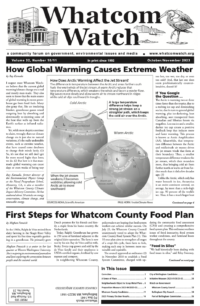Official Ballot Title:
City of Bellingham Initiative 2023-01 concerns establishing a City minimum wage above the State minimum wage. This measure would establish a City minimum wage that is $1.00 above the State minimum wage on May 1, 2024, increasing to $2.00 above the State minimum wage on May 1, 2025. The measure prohibits retaliation by employers against employees; establishes a private right of action for employees; gives the City access to work sites and records; and allows the City to issue civil infractions and order injunctive relief including reinstatement, restitution, and payment of back wages.
Statement For
Why should we vote yes on Initiative 2023-01?
The past few years have weighed heavily on our community in Bellingham. Impacts from the pandemic still reverberate through residents and businesses. Housing costs keep rising with little to stop them, and many folks have lost their homes and stability. Over 13,000 signatures gathered from the community agree that something must be done about these issues and that Initiative 2023-01 is a good place to start.
Wages in Bellingham have been falling behind the cost of living. We are fortunate to live in such a beautiful place — but the rising expense of residing somewhere highly coveted has consequences for our community.
For many working families, it has become a regular hardship to make ends meet. Workers who make minimum wage in Bellingham are hit the hardest. Many are working multiple jobs to afford housing and basic necessities. Living paycheck to paycheck, one crisis away from financial ruin causes constant stress that echoes through our city.
Minimum wage work keeps our economy moving. Grocery workers, those in the service industry, and entry-level laborers all deserve to afford to live safely and retain their housing.
The MIT Living Wage Calculator finds that a living wage in Bellingham in 2023 for a single adult with no dependents is $17.30/hour. When we expect workers, especially those with children, to live paycheck to paycheck, our local economy and community are undermined. A modest increase of $2 in the minimum wage in Bellingham by 2025 will improve the living standards of minimum-wage workers by putting an additional $4,160/year in their pockets.
When wages go up, the community benefits through stimulated consumer spending, business support, and economic growth. Small businesses would benefit from more consumers being able to afford their goods and services. A local minimum wage set at $2 above the state minimum wage by 2025 will help workers afford to stay and spend in our city.
Please vote YES on Initiative 2023-01 to support Bellingham workers and a strong local economy.
Statement prepared by:
Devan Fischer lives in Bellingham and works as a full-time caregiver. She is passionate about her community and advocating for worker and housing justice.
Statement Against
No on Initiative 2023-01
The proponents say this initiative is for affordability. We agree our community is not affordable for many of our residents. Unfortunately, the primary thing this initiative will do is simply make things more expensive — thus decreasing everyone’s affordability. If a higher minimum wage leads to affordability, we should already be affordable with the highest minimum wage in the nation.
If this were to pass, our minimum wage will be approximately $18.75/hr. in less than 20 months. We will have four payroll increases over the next 20 months, on 1/1/24, 5/1/24, 1/1/25, and 5/1/25. This final date will put our minimum wage at $2.00 more than the state.
Two things will almost certainly happen — the cost of living (both goods and services) will increase, and wages will increase along the spectrum, not just at the lowest level. Every business/industry reacts to increased expenses differently — a restaurant may increase prices as they are always on thin margins, whereas a larger retailer may cut hours, shifts, employees, or operating hours. In either case, costs will likely increase. Wage compression will spread increases to those making well above the minimum wage.
In our recent survey of businesses, 90-plus percent expect most employees to want the same increase. If you have an employee currently at $18.50 (a touch less than $3 more than the current MW), and, in less than two years, this person will be making the MW along with others they may have to train, this person is highly likely to want an increase as well. In fact, I am sure most people will be asking for that same $2 increase.
We can somewhat guess on what will happen. Life will become even more difficult for those with fixed, limited/low, or no incomes. Goods and services will become even more expensive. Most people will want and expect increased wages along the wage spectrum to help compensate for that. Some businesses will choose to close. While this is very hard to prove, I think so many of our businesses are on thin margins already. Businesses will choose not to locate here. Also, hard to prove, but look at how few high wage employers we have in our community. Our policies make and have made it very difficult for employers to succeed here, which is why we have a large percentage of retail, restaurant, and hospitality businesses — the same businesses who will be impacted the most.
While the idea of increasing the minimum wage may seem like a straightforward solution to address income inequality and improve the lives of low-wage workers, it is essential to consider the potential negative impacts on certain residents, businesses, job opportunities, and the overall economy. Striking a balance between fair wages and the sustainability of businesses is a complex challenge that requires careful consideration and analysis of the potential consequences. It is crucial for policymakers and voters to weigh both the intended benefits and unintended negative consequences when making decisions about minimum wage increases.
Statement prepared by:
Guy Occhiogrosso has been a chamber leader in Whatcom County since 2006 and has proudly served the Bellingham Regional Chamber of Commerce since 2014 as President/CEO.




























